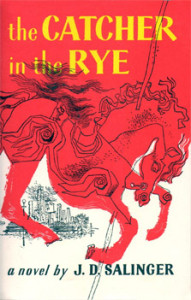| Title: | The Grapes of Wrath |
| Author: | |
| Publisher: | |
| Location: | New York, United States |
| Published: | April 14, 1939 |
| Genre: |
| Pages: | 619 |
| Price: | 10s |
The Catcher in the Rye is a novel by , published by in 1951.
First Edition Identification Points
All of the following points must be present to ensure a true first edition / first printing.
- The copyright page has the following text at the top:
COPYRIGHT 1945, 1946, 1951 BY J. D. SALINGER
ALL RIGHTS RESERVED. NO PART OF THIS BOOK IN EXCESS OF FIVE
HUNDRED WORDS MAY BE REPRODUCED IN ANY FORM WITHOUT
PERMISSION IN WRITING FROM THE PUBLISHER
FIRST EDITION
- Front flap of dust jacket has the price “$3.00” at the top, with the “$”, the “3” and the “.” directly above the “R” in SALINGER
- The back cover has a photograph of the author taken by Lotte Jacobi, and the top of Salinger’s head is slightly cropped off
- Back flap of dust jacket lists “THE CATCHER IN THE RYE is a Book-of-the-Month Club selection” at the bottom (all versions have this, not just Book Club Editions)
- 8vo black cloth boards with gilt lettering on the spine
Later Editions’ Identification Points
The applicable printing numbers are listed in brackets when known.
- The copyright page does not state “FIRST EDITION” [2+]
- Through the fourteenth printing at least, the text lists the initial publishing month and year followed by the re-print month and year. It also lists the number of reprints that month in parentheses if there were more than one. For example, the third printing looks like this:
First published July 1951
Reprinted July 1951 (two times)
- By the nineteenth printing (and perhaps earlier), the copyright page no longer lists the initial publishing and later reprint dates. Instead it simply lists the printing number in italics like so: “Nineteenth printing” [19 through at least 41]
- Front flap of dust jacket still has the price “$3.00” at the top; the exact horizontal placement of the price varies by printing [2 through at least 14]
- By the nineteenth printing (and perhaps earlier), the price listed at the top of the front flap of the dust jacket is “$4.00”; later printings increase the price further [19+]
- By the fourteenth printing (and perhaps earlier), J. D. Salinger’s photo is not present on the back cover of the dust jacket. There is either a block of text (quotes about the book) or blank white space [14+]
Book Club Editions’ Identification Points
- Copyright page has no print information (date or print number)
- Front flap of dust jacket has no price listed
- Back cover has Book-of-the-Month club indentation
- Front flap of dust jacket lists “BOOK-OF-THE-MONTH CLUB* SELECTION” at the top
- Front flap of dust jacket lists “*Trade Mark of Book-of-the-Month Club, Inc.” at the bottom
- Front flap of dust jacket lists “Book Club Edition” at the bottom
- Back flap of dust jacket lists “BOOK-OF-THE-MONTH” at the top
- Early Book Club Editions have the Lotte Jacobi photograph of the author on the back cover of the dust jacket; later editions have blank white space
- An insert of a report by Clifton Fadiman reprinted from “Book-of-the-Month Club News“
- Copyright page lists “ALL RIGHTS RESERVED. NO PART OF THIS BOOK MAY BE REPRODUCED IN ANY FORM OR BY ANY ELECTRONIC OR MECHANICAL MEANS INCLUDING INFORMATION STORAGE AND RETRIEVAL SYSTEMS WITHOUT PERMISSION IN WRITING FROM THE PUBLISHER, EXCEPT BY A REVIEWER WHO MAY QUOTE BRIEF PASSAGES IN REVIEW”
Publication History
J. D. Salinger (birth name Jerome David Salinger) wrote numerous short stories containing similar themes and characters (including Holden Caulfield) in the early 1940s. While serving in World War II, Salinger wrote six chapters with the character and got feedback on his writing from Ernest Hemingway. In 1950, The New Yorker rejected a 90-page novella version of The Catcher in the Rye. In the same year, Harcourt Brace & Company accepted the manuscript but had notes and requested a re-write; Salinger withdrew the book. Little, Brown and Company published the book July 16, 1951 at a price of $3.00. It was also published for numerous book clubs as well as by cheaper re-print publishing houses. The book has been tremendously successful as well as one of the most censored and challenged novels of the twentieth century.

